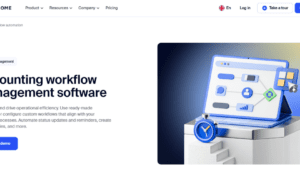Organizations are increasingly turning to accounting software to improve their financial management processes. This software not only automates traditional accounting tasks but also enhances decision-making through real-time data access. By integrating technology into their financial systems, businesses can focus on strategic initiatives rather than being bogged down by manual data entry and reconciliation. This shift towards digital financial stewardship can lead to significant improvements in operational performance and overall financial health.
Streamlining The Workflow
Streamlining workflow represents a fundamental advantage offered by accounting software. Traditional accounting processes often involve tedious manual tasks, from data entry to generating reports. These labor-intensive operations can lead to human errors, miscommunications, and delayed financial insights. With the right accounting software, organizations can automate routine tasks, thereby increasing efficiency and accuracy. For instance, invoicing and payment processing can be automated, reducing the time spent on these mobile processes.
Implementing workflows that utilize templates can help to save time. Better teamwork is made possible by combining different financial operations into a single platform, which frequently results in speedier decision-making. Take your time to learn more about streamlining your workflow with modern accounting software. Automating repetitive tasks within these workflows can further enhance efficiency, reducing the risk of human error. Integrating real-time data tracking allows for more accurate financial forecasting and reporting. Businesses can increase overall production while adhering to financial requirements by utilizing these technologies.
Enhancing Data Accuracy
One of the hallmark benefits of accounting software is its ability to enhance data accuracy. Manual accounting tasks are prone to human error, which can have devastating effects on a business’s financial standing. With features such as built-in error-checking algorithms and automated calculations, accounting software significantly reduces the likelihood of mistakes. Data collected through these systems is stored in a centralized database, making it easier to verify and audit. This reliability is essential for regulatory compliance and can help organizations prepare for audits without the stress of disorganized data. Enhanced accuracy leads to better financial forecasting and strategic planning.
Facilitating Better Financial Reporting
Financial reporting is crucial for both internal stakeholders and regulatory compliance. Accounting software not only simplifies the reporting process but also provides real-time insights. Automated reporting allows organizations to generate financial statements and reports on demand, offering a more current perspective on their financial situation. Users can customize their reports to focus on specific metrics, enabling better analysis. This capability helps in identifying trends and potential issues long before they escalate into larger problems. Enhanced visibility into financial performance aids management in making informed decisions that align with their organizational goals.
Integration with Other Business Systems
The ability to integrate accounting software with other business systems is a substantial benefit. Many modern accounting platforms can seamlessly connect with various enterprise resource planning (ERP) systems, customer relationship management (CRM) software, and other operational tools. This integration ensures that data flows smoothly across departments, allowing for a more comprehensive view of organizational performance. For example, sales data captured in a CRM can automatically update financial records, ensuring that revenue figures are current and accurate. Real-time data access allows all departments to be aligned, which is particularly beneficial for cross-functional teams that rely on accurate information to execute their strategies effectively.
Improving Compliance and Security
As regulatory requirements become more stringent, the importance of compliance cannot be overstated. Accounting software often comes equipped with features designed to ensure compliance with local and international regulations. This built-in functionality reduces the risk of audit penalties and violations. Data security is a paramount concern in today’s digital landscape. Many accounting software solutions offer robust security measures, including encryption and regular system updates. This helps safeguard sensitive financial data against breaches, ensuring that organizations can operate with peace of mind.
Cost Efficiency
Investing in accounting software might seem like a significant expenditure at first glance; however, it can lead to substantial cost savings over time. By automating routine tasks, organizations can reduce their reliance on manual labor. This not only cuts down on labor costs but also minimizes errors that could lead to costly rectifications. The time saved from automating key processes allows staff to focus on high-value areas, such as strategic planning and innovation. Many accounting software solutions also offer flexible pricing structures, making them accessible to organizations of all sizes.
When financial management is transformed through the adoption of accounting software, organizations stand to benefit in numerous ways. From streamlining workflows and enhancing data accuracy to improving compliance and cost efficiency, the advantages are clear. Embracing technology in finance is not just a trend but a necessity for organizations seeking sustained growth and operational excellence.



































